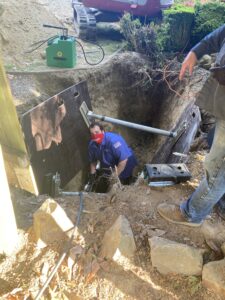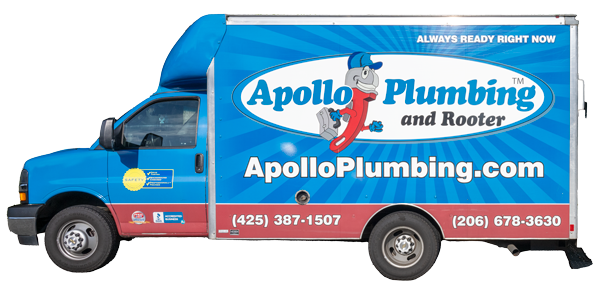 Leaky pipes are more than just an inconvenience—they can cause significant water waste and structural damage if left unaddressed. For instance, the average household wastes over 10,000 gallons of water each year due to leaks.
Leaky pipes are more than just an inconvenience—they can cause significant water waste and structural damage if left unaddressed. For instance, the average household wastes over 10,000 gallons of water each year due to leaks.
While visible leaks are straightforward to detect and fix, hidden slab leaks present a unique challenge. Addressing slab leaks promptly is crucial to prevent extensive damage to your home and skyrocketing water bills.
Understanding Slab Leaks
Slab leaks occur when water pipes installed under a concrete slab foundation develop leaks.
This type of foundation, popular in many homes built in the mid-20th century. The basic construction process includes laying down the pipes first and then covering them with a thick layer of concrete.
Common Causes of Slab Leaks
Several factors can contribute to the development of slab leaks:
Soil Expansion or Contraction: Soil movement, especially in certain types of soil, can exert pressure on water pipes, causing them to crack or burst.
Poor Construction: Improper installation and the use of subpar materials can lead to premature pipe failure.
Chemical Factors: Corrosive water chemistry and alkaline soils can accelerate the deterioration of pipes, leading to leaks.
Corroded Pipes: Older materials like cast iron, galvanized steel, and Orangeburg are more susceptible to corrosion and failure.
Tree Roots: Tree roots can invade and puncture pipes, particularly if they are located near the foundation.
Commercial Waste Pipe Cleaners: Harsh chemicals can corrode pipes over time. It’s important to hire experienced and certified plumbing contractors for maintenance and repairs.
How to Detect Water Leak Under Slab
Detecting a slab leak can be challenging due to its hidden nature.
However, some common signs can indicate a problem:
- Increased water bills
- Sudden decrease in water pressure
- Warm spots on the floor (which pets may prefer)
- Shifts in the foundation
- Water collecting in unexpected areas
- Damp areas on the carpet
- Warped and raised hardwood flooring
- Constantly running hot water heater
- Higher-than-normal water bills (and possibly gas/electric bills if the leak involves hot water)
- Presence of mold/mildew in walls or under carpet
- Sound of running water when no taps are open
Challenges of Fixing Slab Leaks
Fixing slab leaks is complex due to the difficulty of accessing pipes under concrete slabs. It often involves digging up the foundation or rerouting pipes, which can be disruptive.
Professional plumbers use specialized leak detection equipment to locate the leak accurately and minimize disruption to your home.
Additionally, homeowner’s insurance in Washington may cover the costs, but it’s important to confirm with your provider.
Options for Fixing a Slab Leak
 When fixing a slab leak, there are different methods to choose from, each with its own benefits and specific uses. Knowing these options can help homeowners make smart choices and collaborate with expert plumbers to choose the most effective repair plan.
When fixing a slab leak, there are different methods to choose from, each with its own benefits and specific uses. Knowing these options can help homeowners make smart choices and collaborate with expert plumbers to choose the most effective repair plan.
Trenchless Slab Leak Repair
Trenchless slab leak repair is a modern and less invasive technique compared to traditional methods. This approach avoids the need to dig up large sections of your foundation, reducing damage and disruption to your home.
Epoxy Pipe Lining: One common trenchless repair technique is epoxy pipe lining. This involves cleaning the inside of the existing pipes and then coating them with an epoxy resin. The resin cures to form a new, durable pipe within the old one, effectively sealing any leaks and preventing future corrosion.
Pipe Splitting: Another trenchless method is pipe splitting, where a new pipe is pulled through the old one, splitting the damaged pipe apart and replacing it with a new, seamless pipe. This method is particularly useful for severely damaged pipes.
Pipe Re-Piping or Re-Routing
Re-piping or re-routing is necessary when the existing pipes are extensively damaged or when multiple leaks are present. It involves replacing the old pipes entirely or re-routing them around the damaged sections.
Involvement of Demolition and Timeline: This method can be more invasive, often requiring demolition of parts of the slab or walls to access and replace the pipes. The timeline for this repair depends on the extent of the damage and the complexity of the plumbing system. However, it provides a long-term solution by installing new, leak-free pipes.
Tunneling Under the Slab
Tunneling is an alternative to breaking through the slab from above. Instead, plumbers dig tunnels under the house to reach the leaking pipes. This method minimizes disruption inside the home, preserving flooring and interior finishes.
Process and Benefits: The process involves creating access points outside the house and carefully digging tunnels to the location of the leaks. Tunneling allows plumbers to repair or replace pipes without disturbing the home’s interior, making it an attractive option for many homeowners. It also enables a more comprehensive inspection and repair of the plumbing system.
Duration of Repairs
The time required to complete slab leak repairs varies depending on the chosen method. Trenchless repairs, like epoxy lining, can often be completed within a day or two, while more extensive re-piping or tunneling projects may take several days to a week. It’s important to discuss timelines with your plumber to set realistic expectations and plan accordingly.
Apollo Plumbing Can Help
 Addressing slab leaks urgently is crucial to prevent further damage. Apollo Plumbing offers comprehensive water leak detection and repair services. Our plumbers are clean, screened, trained, and timely. Schedule an appointment with us today to ensure your home stays leak-free.
Addressing slab leaks urgently is crucial to prevent further damage. Apollo Plumbing offers comprehensive water leak detection and repair services. Our plumbers are clean, screened, trained, and timely. Schedule an appointment with us today to ensure your home stays leak-free.
Final Thoughts
Detecting and fixing slab leaks is essential for maintaining your home’s structural integrity and preventing water waste. Regular maintenance and proactive inspections can help prevent leaks. For expert assistance, contact Apollo Plumbing and hire experienced and certified plumbing contractors.
FAQs – Slab Leaks
What is a slab leak?
A slab leak is a leak that occurs in the water pipes located under a concrete slab foundation. These leaks can be difficult to detect and can cause extensive damage to your home if left untreated.
What causes slab leaks?
Slab leaks can be caused by several factors, including soil expansion or contraction, poor construction, chemical factors such as corrosive water or alkaline soil, old and corroded pipes, tree root intrusion, and the use of harsh commercial pipe cleaners.
How can I tell if I have a slab leak?
Common signs of a slab leak include increased water bills, sudden decreases in water pressure, warm spots on the floor, foundation shifts, unexpected water pooling, damp carpet areas, warped or raised flooring, constantly running hot water heater, and the presence of mold or mildew.
What should I do if I suspect a slab leak?
If you suspect a slab leak, it is important to contact a professional plumber immediately. They can use specialized leak detection equipment to locate the leak and recommend the best repair method.
How are slab leaks detected?
Plumbers use advanced leak detection equipment, such as electronic listening devices, ground microphones, and infrared cameras, to accurately locate slab leaks without causing unnecessary damage to your home.
Can slab leaks cause significant damage to my home?
Yes, slab leaks can cause extensive water damage to your home’s foundation, flooring, and walls. Over time, this can lead to structural issues, mold growth, and costly repairs.
What are the common methods for fixing slab leaks?
Common methods for fixing slab leaks include trenchless slab leak repair (epoxy pipe lining and pipe splitting), pipe re-piping or re-routing, and tunneling under the slab. The best method depends on the severity and location of the leak.
How long does it take to repair a slab leak?
The duration of slab leak repairs varies depending on the method used. Trenchless repairs can often be completed in a day or two, while more extensive re-piping or tunneling projects may take several days to a week.
Will my homeowner’s insurance cover slab leak repairs?
Coverage for slab leak repairs depends on your homeowner’s insurance policy. Some policies may cover the cost of locating and repairing the leak, while others may only cover certain types of damage. It’s important to review your policy or consult with your insurance provider.
Can slab leaks be prevented?
While it’s difficult to completely prevent slab leaks, regular maintenance and inspections of your plumbing system can help identify potential issues before they become major problems. Avoid using harsh chemicals in your pipes and be mindful of tree placement near your foundation.
Why should I hire a professional plumber for slab leak repairs?
Professional plumbers have the expertise and specialized equipment needed to accurately detect and repair slab leaks. Attempting DIY repairs can lead to further damage and increased costs.
What is the cost of repairing a slab leak?
A: The cost of repairing a slab leak varies based on the repair method and the extent of the damage. Trenchless repairs tend to be less expensive and less invasive, while re-piping or tunneling may be more costly. It’s best to get a quote from a professional plumber for an accurate estimate.

